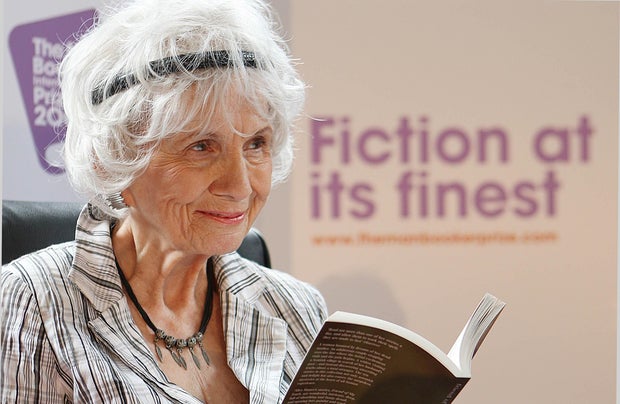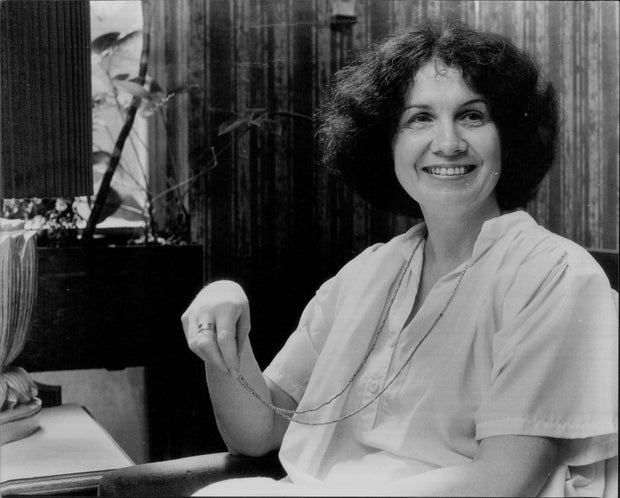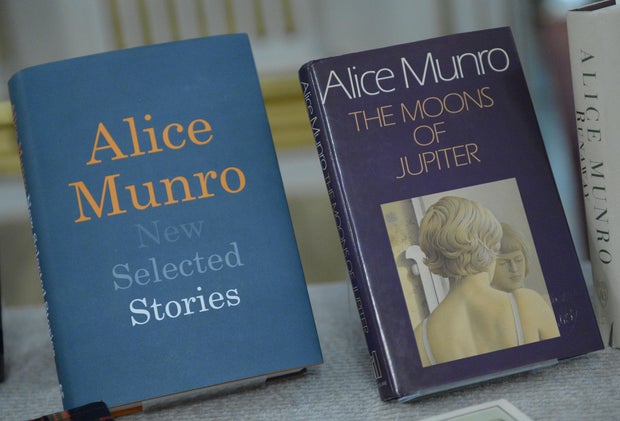CBS News
Alice Munro, Nobel laureate revered as short story master, dies at 92

Nobel laureate Alice Munro, the Canadian literary giant who became one of the world’s most esteemed contemporary authors and one of history’s most honored short story writers, has died at age 92.
A spokesperson for publisher Penguin Random House Canada said Munro, winner of the Nobel literary prize in 2013, died Monday at home in Port Hope, Ontario. Munro had been in frail health for years and often spoke of retirement, a decision that proved final after the author’s 2012 collection, “Dear Life.”
Often ranked with Anton Chekhov, John Cheever and a handful of other short story writers, Munro achieved stature rare for an art form traditionally placed beneath the novel. She was the first lifelong Canadian to win the Nobel and the first recipient cited exclusively for short fiction. Echoing the judgment of so many before, the Swedish academy pronounced her a “master of the contemporary short story” who could “accommodate the entire epic complexity of the novel in just a few short pages.”
Munro, little known beyond Canada until her late 30s, also became one of the few short story writers to enjoy ongoing commercial success. Sales in North America alone exceeded 1 million copies and the Nobel announcement raised “Dear Life” to the high end of The New York Times’ bestseller list for paperback fiction. Other popular books included “Too Much Happiness,” “The View from Castle Rock” and “The Love of a Good Woman.”
Dozens of classics
Over a half century of writing, Munro perfected one of the greatest tricks of any art form: illuminating the universal through the particular, creating stories set around Canada that appealed to readers far away. She produced no single definitive work, but dozens of classics that were showcases of wisdom, technique and talent – her inspired plot twists and artful shifts of time and perspective; her subtle, sometimes cutting humor; her summation of lives in broad dimension and fine detail; her insights into people across age or background, her genius for sketching a character, like the adulterous woman introduced as “short, cushiony, dark-eyed, effusive. A stranger to irony.”
Her best known fiction included “The Beggar’s Maid,” a courtship between an insecure young woman and an officious rich boy who becomes her husband; “Corrie,” in which a wealthy young woman has an affair with an architect “equipped with a wife and young family”; and “The Moons of Jupiter,” about a middle-aged writer who visits her ailing father in a Toronto hospital and shares memories of different parts of their lives.
“I think any life can be interesting,” Munro said during a 2013 post-prize interview for the Nobel Foundation. “I think any surroundings can be interesting.”
Julien Behal – PA Images/PA Images via Getty Images
Disliking Munro, as a writer or as a person, seemed almost heretical. The wide and welcoming smile captured in her author photographs was complemented by a down-to-earth manner and eyes of acute alertness, fitting for a woman who seemed to pull stories out of the air the way songwriters discovered melodies. She was admired without apparent envy, placed by the likes of Jonathan Franzen, John Updike and Cynthia Ozick at the very top of the pantheon. Munro’s daughter, Sheila Munro, wrote a memoir in which she confided that “so unassailable is the truth of her fiction that sometimes I even feel as though I’m living inside an Alice Munro story.” Fellow Canadian author Margaret Atwood called her a pioneer for women, and for Canadians.
“Back in the 1950s and 60s, when Munro began, there was a feeling that not only female writers but Canadians were thought to be both trespassing and transgressing,” Atwood wrote in a 2013 tribute published in the Guardian after Munro won the Nobel. “The road to the Nobel wasn’t an easy one for Munro: the odds that a literary star would emerge from her time and place would once have been zero.”
Although not overtly political, Munro witnessed and participated in the cultural revolution of the 1960s and ’70s and permitted her characters to do the same. She was a farmer’s daughter who married young, then left her husband in the 1970s and took to “wearing miniskirts and prancing around,” as she recalled during a 2003 interview with The Associated Press. Many of her stories contrasted the generation of Munro’s parents with the more open-ended lives of their children, departing from the years when housewives daydreamed “between the walls that the husband was paying for.”
Moviegoers would become familiar with “The Bear Came Over the Mountain,” the improbably seamless tale of a married woman with memory loss who has an affair with a fellow nursing home patient, a story further complicated by her husband’s many past infidelities. “The Bear” was adapted by director Sarah Polley into the feature film “Away from Her,” which brought an Academy Award nomination for Julie Christie. In 2014, Kristen Wiig starred in “Hateship, Loveship,” an adaptation of the story “Hateship, Friendship, Courtship, Loveship, Marriage,” in which a housekeeper leaves her job and travels to a distant rural town to meet up with a man she believes is in love with her – unaware the romantic letters she has received were concocted by his daughter and a friend.
Honored by numerous prizes
Even before the Nobel, Munro received honors from around the English-language world, including Britain’s Man Booker International Prize and the National Book Critics Circle award in the U.S., where the American Academy of Arts and Letters voted her in as an honorary member. In Canada, she was a three-time winner of the Governor General’s Award and a two-time winner of the Giller Prize.
Munro was a short story writer by choice, and, apparently, by design. Judith Jones, an editor at Alfred A. Knopf who worked with Updike and Anne Tyler, did not want to publish “Lives of Girls & Women,” her only novel, writing in an internal memo that “there’s no question the lady can write but it’s also clear she is primarily a short story writer.”
Munro would acknowledge that she didn’t think like a novelist.
“I have all these disconnected realities in my own life, and I see them in other people’s lives,” she told the AP. “That was one of the problems, why I couldn’t write novels. I never saw things hanging together too well.”
Alice Ann Laidlaw was born in Wingham, Ontario, in 1931, and spent much of her childhood there, a time and place she often used in her fiction, including the four autobiographical pieces that concluded “Dear Life.” Her father was a fox farmer, her mother a teacher and the family’s fortunes shifted between middle class and working poor, giving the future author a special sensitivity to money and class. Young Alice was often absorbed in literature, starting with the first time she was read Hans Christian Andersen’s “The Little Mermaid.” She was a compulsive inventor of stories and the “sort of child who reads walking upstairs and props a book in front of her when she does the dishes.”
A top student in high school, she received a scholarship to study at the University of Western Ontario, majoring in journalism as a “cover-up” for her pursuit of literature. She was still an undergraduate when she sold a story about a lonely teacher, “The Dimensions of a Shadow,” to CBC Radio. She was also publishing work in her school’s literary journal.
One fellow student read “Dimensions” and wrote to the then-Laidlaw, telling her the story reminded him of Chekhov. The student, Gerald Fremlin, would become her second husband. Another fellow student, James Munro, was her first husband. They married in 1951, when she was only 20, and had four children, one of whom died soon after birth.
Paul Stephen Pearson/Fairfax Media via Getty Images
Settling with her family in Vancouver, Alice Munro wrote between trips to school, housework and helping her husband at the bookstore that they co-owned and would turn up in some of her stories. She wrote one book in the laundry room of her house, her typewriter placed near the washer and dryer. Flannery O’Connor, Carson McCullers and other writers from the American South inspired her, through their sense of place and their understanding of the strange and absurd.
Isolated from the literary center of Toronto, she did manage to get published in several literary magazines and to attract the attention of an editor at Ryerson Press (later bought out by McGraw Hill). Her debut collection, “Dance of the Happy Shades,” was released in 1968 with a first printing of just under 2,700 copies. A year later it won the Governor’s General Award and made Munro a national celebrity – and curiosity. “Literary Fame Catches City Mother Unprepared,” read one newspaper headline.
“When the book first came they sent me a half dozen copies. I put them in the closet. I didn’t look at them. I didn’t tell my husband they had come, because I couldn’t bear it. I was afraid it was terrible,” Munro told the AP. “And one night, he was away, and I forced myself to sit down and read it all the way through, and I didn’t think it was too bad. And I felt I could acknowledge it and it would be OK.”
From “housewife” to “writer”
By the early ’70s, she had left her husband, later observing that she was not “prepared to be a submissive wife.” Her changing life was best illustrated by her response to the annual Canadian census. For years, she had written down her occupation as “housewife.” In 1971, she switched to “writer.”
Over the next 40 years, her reputation and readership only grew, with many of her stories first appearing in The New Yorker. Her prose style was straightforward, her tone matter of fact, but her plots revealed unending disruption and disappointments: broken marriages, violent deaths, madness and dreams unfulfilled, or never even attempted. “Canadian Gothic” was one way she described the community of her childhood, a world she returned to when, in middle age, she and her second husband relocated to nearby Clinton.
“Shame and embarrassment are driving forces for Munro’s characters,” Atwood wrote, “just as perfectionism in the writing has been a driving force for her: getting it down, getting it right, but also the impossibility of that.”
JONATHAN NACKSTRAND/AFP via Getty Images
She had the kind of curiosity that would have made her an ideal companion on a long train ride, imagining the lives of the other passengers. Munro wrote the story “Friend of My Youth,” in which a man has an affair with his fiancee’s sister and ends up living with both women, after an acquaintance told her about some neighbors who belonged to a religion that forbade card games. The author wanted to know more – about the religion, about the neighbors.
Even as a child, Munro had regarded the world as an adventure and mystery and herself as an observer, walking around Wingham and taking in the homes as if she were a tourist. In “The Peace of Utrecht,” an autobiographical story written in the late 1960s, a woman discovers an old high school notebook and remembers a dance she once attended with an intensity that would envelop her whole existence.
“And now an experience which seemed not at all memorable at the time,” Munro wrote, “had been transformed into something curiously meaningful for me, and complete; it took in more than the girls dancing and the single street, it spread over the whole town, its rudimentary pattern of streets and its bare trees and muddy yards just free of the snow, over the dirt roads where the lights of cars appeared, jolting toward the town, under an immense pale wash of sky.”
CBS News
Capturing Moriah Wilson’s Killer – CBS News

Watch CBS News
Be the first to know
Get browser notifications for breaking news, live events, and exclusive reporting.
CBS News
How to watch the Minnesota Vikings vs. Chicago Bears NFL game today: Livestream options, more

Getty Images
The Minnesota Vikings will take on the Chicago Bears today. The Vikings are currently 8-2, an impressive run so far this season, and will be looking to add a fourth win to their current streak after last Sunday’s 23-13 win against the Tennessee Titans. The Bears, on the other hand, are entering this game on the heels of a four-game losing streak after a tough 20-19 loss against the Green Bay Packers last Sunday.
Here’s how and when you can watch the Vikings vs. Bears game today, whether or not you have cable.
How and when to watch the Minnesota Vikings vs. Chicago Bears
The Vikings vs. Bears game will be played on Sunday, November 24, 2024 at 1:00 p.m. ET (11:00 a.m. PT). The game will air on Fox and stream on Fubo and the platforms featured below.
How and when to watch the Minnesota Vikings vs. Chicago Bears game without cable
You can watch this week’s NFL game on Fox via several streaming services. All you need is an internet connection and one of the top options outlined below.
Fubo offers you an easy, user-friendly way to watch NFL games on CBS, Fox, NBC, ABC, ESPN, and NFL Network, plus NCAA football channels. The Pro tier includes 200+ channels and unlimited DVR, while the Elite with Sports Plus tier adds NFL RedZone and 4K resolution. New subscribers get a seven-day free trial and all plans allow streaming on up to 10 screens simultaneously.
You can watch today’s game with a subscription to Sling’s Orange + Blue tier, which includes ESPN, ABC, NBC, and Fox. The plan offers 46 channels with local NFL games, nationally broadcast games and 50 hours of DVR storage. For complete NFL coverage, add Paramount+ to get CBS games, or upgrade with the Sports Extra add-on for additional sports channels like Golf Channel, NBA TV and NFL RedZone.
Watching NFL games, including Fox broadcasts, is simple with Hulu + Live TV, which includes 90 channels, unlimited DVR storage, and access to NFL preseason games, live regular season games and studio shows. The service includes ESPN+ and Disney+ in the subscription.
Want to watch today’s game live on your smartphone? If so, NFL+ streaming service is the solution you’re looking for. It lets you watch NFL Network and out-of-market games on mobile devices, with an upgrade option to NFL+ Premium that includes NFL RedZone for watching up to eight games simultaneously. Note that NFL+ only works on phones and tablets, not TVs.
CBS News
How to watch the Detroit Lions vs. Indianapolis Colts NFL game today: Livestream options, more

Nic Antaya/Getty Images
The Detroit Lions will face off against the Indianapolis Colts today. The Lions enter this game as top contenders with a near-perfect record of 9-1 so far this season. The Colts, who are 5-6 this season, could have a tough game on their hands against the Lions but will be looking to rack up another win after prevailing over the New York Jets in a tight game last Sunday.
Here’s how and when you can watch the Colts vs. Lions game today, whether or not you have cable.
Here’s how and when to watch the Detroit Lions vs. Indianapolis Colts
The Lions vs. Colts game will be played on Sunday, November 24, 2024 at 1:00 p.m. ET (11:00 a.m. PT). The game will air on Fox and stream on Fubo and the platforms featured below.
How and when to watch the Detroit Lions vs. Indianapolis Colts game without cable
You can watch this week’s NFL game on Fox via several streaming services. All you need is an internet connection and one of the top options outlined below.
Experience NFL action like never before with Fubo’s comprehensive sports streaming platform. From Sunday showdowns to primetime matchups, catch every NFL game across major networks including CBS, Fox, NBC, ABC, ESPN and NFL Network. Choose the Pro package to unlock 200+ channels and limitless DVR storage, or elevate your game-day experience with the Elite with Sports Plus package, featuring NFL RedZone’s commercial-free scoring highlights and stunning 4K quality.
Test drive the service with a no-commitment seven-day free trial, and share the excitement with family and friends — Fubo supports simultaneous streaming on up to 10 devices, so everyone can watch their favorite teams.
You can watch today’s game with a subscription to Sling’s Orange + Blue tier, which includes ESPN, ABC, NBC, and Fox. The plan offers 46 channels with local NFL games, nationally broadcast games, and 50 hours of DVR storage. For complete NFL coverage, add Paramount+ to get CBS games, or upgrade with the Sports Extra add-on for additional sports channels like Golf Channel, NBA TV and NFL RedZone.
Watching NFL games, including Fox broadcasts, is simple with Hulu + Live TV, which includes 90 channels, unlimited DVR storage, and access to NFL preseason games, live regular season games and studio shows. The service includes ESPN+ and Disney+ in the subscription.
Want to watch today’s game live on your smartphone? If so, NFL+ streaming service is the solution you’re looking for. It lets you watch NFL Network and out-of-market games on mobile devices, with an upgrade option to NFL+ Premium that includes NFL RedZone for watching up to eight games simultaneously. Note that NFL+ only works on phones and tablets, not TVs.












